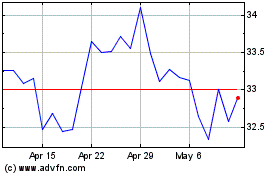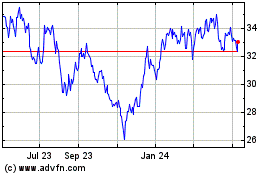AB Science SA (NYSE Euronext - FR0010557264 - AB), a
pharmaceutical company specializing in the research, development
and commercialization of protein kinase inhibitors (PKIs),
announces the publication of results from the first randomized
phase 3 study of masitinib in treatment of advanced pancreatic
ductal adenocarcinoma (PDAC). Entitled, 'A randomized,
placebo-controlled phase III trial of masitinib plus gemcitabine in
the treatment of advanced pancreatic cancer' this article and its
accompanying Online Supplementary Material are freely accessible
online from the peer-reviewed journal Annals of Oncology:
http://annonc.oxfordjournals.org/lookup/doi/10.1093/annonc/mdv133.
A phase 3 confirmatory study is currently ongoing.
- Findings revealed that the markers of acyl-CoA oxidase-1
(ACOX1) expression in blood and baseline pain intensity may have
prognostic value, with patients from these subgroups experiencing
aggressive disease progression while receiving Gemzar®
(gemcitabine, from Eli Lilly and Company).
- In patients with over-expression of ACOX1 in blood,
administration of masitinib in combination with Gemzar® produced a
statistically significant overall survival advantage of +6.1 months
(Hazard Ratio=0.23[0.10;0.51]) when compared with placebo
administered in combination with Gemzar®.
- In the pain subgroup, administration of masitinib in
combination with Gemzar® produced a statistically significant
overall survival advantage of +2.6 months (Hazard
Ratio=0.62[0.43;0.89]) when compared with placebo
administered in combination with Gemzar®.
- Safety of the combination remained acceptable with no
overall detrimental effect on quality of life.
- A new confirmatory phase 3 trial of masitinib in advanced
pancreatic cancer has been initiated, with an objective to
replicate these promising results in a prospective manner.
- Predictive markers of masitinib efficacy
Reported in this article are results of a phase
3 study conducted by Professor Gaël Deplanque (Saint Joseph
Hospital, Paris, France) and colleagues from 73 active centers
located predominantly in France, United States and Czech Republic.
In this study, 353 patients with inoperable, chemotherapy-naïve,
PDAC received gemcitabine in combination with either masitinib or
placebo until progression. The primary endpoint was overall
survival (OS).
Secondary OS analyses aimed to characterize
subgroups with poor survival while receiving single-agent
gemcitabine with subsequent evaluation of whether masitinib
generated therapeutic benefit in these subgroups.
While median OS was similar between
treatment-arms for the overall population, secondary analyses
identified two subgroups having significantly poor survival when
receiving single-agent gemcitabine. One subgroup was defined by an
over-expression of acyl-CoA oxidase-1 (ACOX1) in blood, and the
other subgroup was defined by patients exceeding a pain intensity
threshold assessed via a visual analog scale (VAS) at baseline.
These subgroups represent a critical unmet medical need as
evidenced from a shorter median OS of approximately 5.5 months, and
comprise an estimated 63% of PDAC patients.
In these subgroups, a significant treatment
effect was observed for masitinib with median OS of 11.7 months in
the 'ACOX1' subgroup (HR=0.23[0.10;0.51],P=0.001), and 8.0 months
in the 'pain' subgroup (HR=0.62[0.43;0.89],P=0.012). Despite
increased toxicity of the combination compared with single-agent
gemcitabine, side-effects remained manageable.
There is evidence from the scientific literature
in support of biological plausibility for the observed masitinib
treatment-effect in patients with baseline pain (VAS > 20). The
presence of pain in PDAC is thought to flag an increased mast cell
activity within the tumor microenvironment which promotes disease
progression. Masitinib's highly selective inhibition of mast cell
activation is expected to be of therapeutic benefit by impacting on
mast cell related remodeling of the tumor microenvironment.
- Patients with ACOX1 over-expression
There is evidence from the scientific literature
in support of biological plausibility for the observed masitinib
treatment-effect in patients ACOX1 over-expression in blood
samples. It is thought that ACOX1 over-expression in blood samples
from PDAC patients may flag a predominance of pro-tumoral
macrophages in the tumor microenvironment. Masitinib induces a
accumulation of anti-tumoral macrophages in the tumor
microenvironment, thereby counteracting tumor-promoting signals and
effectively acting as an immune therapy.
Discovery of this biomarker has also instigated
development of a companion diagnostic test associated with
masitinib. The test developed by AB Science in collaboration with
Acobiom, a biotechnology company specialized in the discovery of
new biomarkers and the development of innovative diagnostics
focused on personalized medicine, will identify patients most
likely to benefit from masitinib treatment. The markers identified
in this phase 3 clinical trial are the joint property of AB Science
and Acobiom, for which patent protection has been filed. AB
Science retains 100% of the rights related to masitinib.
"A potential unmet medical need among
pancreatic ductal adenocarcinoma patients receiving single-agent
gemcitabine has been highlighted with the biomarkers of ACOX1
expression in blood and baseline pain intensity demonstrating
prognostic value" said Dr Gaël Deplanque of Saint Joseph Hospital,
Paris, France, and the principal investigator of this study.
"Moreover, both biomarkers suggested predictive value with the
combination of masitinib and gemcitabine appearing to exhibit a
positive benefit-risk ratio for the treatment of these
subpopulations. A new international phase 3 randomized clinical
trial is currently recruiting patients in this indication to
confirm these encouraging results, which if successful would
support the use of masitinib plus gemcitabine as a new treatment
option for these two subgroups pancreatic cancer patients."
"Pancreatic ductal adenocarcinoma is a
heterogeneous disease making it very challenging to treat and which
probably explains why survival rates have remained stubbornly poor
for so many years. Indeed, such heterogeneity most likely requires
targeted-therapy approaches to improve survival in subgroups of the
overall population" said Professor Olivier Hermine, President of
the Scientific Committee of AB Science. "Findings from this phase 3
study are consistent with evidence that heterogeneity in tumor
biology and microenvironment may be an important determinant of
aggressive versus relatively slow disease progression, which in
turn leads to variability in terms of treatment susceptibility. It
is thought that the presence of baseline pain or an overexpression
of ACOX1 effectively identifies those patients with a pro-tumoral
immune response. The observed treatment-effect of masitinib are
possibly due to its ability to act as an immune therapy, the
benefit of which is to extend survival by controlling the
aggressiveness, transformation and dissemination of the
tumors."
About masitinib Masitinib has received
orphan drug designation in the treatment of pancreatic cancer from
both FDA and EMA.
Masitinib is a new orally administered tyrosine
kinase inhibitor that targets mast cells and macrophages, important
cells for immunity, through inhibiting a limited number of kinases.
Based on its unique mechanism of action, masitinib can be developed
in a large number of conditions in oncology, in inflammatory
diseases, and in certain diseases of the central nervous system. In
oncology due to its immunotherapy effect, masitinib can have an
effect on survival, alone or in combination with chemotherapy.
Through its activity on mast cells and consequently the inhibition
of the activation of the inflammatory process, masitinib can have
an effect on the symptoms associated with some inflammatory and
central nervous system diseases and the degeneration of these
diseases.
About pancreatic ductal adenocarcinoma
Incidence of pancreatic cancer has markedly increased over the last
few decades. Pancreatic cancer is now the twelfth most common
cancer in the world, with 338,000 new cases diagnosed in 20121. The
estimated 5-year prevalence of people in the world living with
pancreatic cancer is 4.1 per 100,000. This cancer is almost always
fatal, and is the seventh most common cause of death from cancer.
Patients diagnosed with pancreatic cancer often have a poorer
prognosis compared with other cancers in part because early
detection is difficult. At the time of diagnosis, most patients
with pancreatic ductal adenocarcinoma present with locally advanced
or metastatic disease and only 10-20% of cases are candidates for
curative surgery. For over a decade single-agent gemcitabine has
been the standard first-line treatment for unresectable, locally
advanced or metastatic pancreatic ductal adenocarcinoma. Median
overall survival is between 6 to 7 months and 1-year survival rates
range between 17 to 25% 2, 3.
1
http://globocan.iarc.fr/Pages/fact_sheets_population.aspx. Accessed
03 March 2015. 2 Heinemann V, et al. BMC Cancer. 2008;8:82. 3 Von
Hoff DD, et al. N Engl J Med. Oct 31 2013;369(18):1691-1703.
About AB Science Founded in 2001, AB
Science is a pharmaceutical company specializing in the research,
development and commercialization of protein kinase inhibitors
(PKIs), a class of targeted proteins whose action are key in
signaling pathways within cells. Our programs target only diseases
with high unmet medical needs, often lethal with short term
survival or rare or refractory to previous line of treatment in
cancers, inflammatory diseases, and central nervous system
diseases, both in humans and animal health. AB Science has
developed a proprietary portfolio of molecules and the Company's
lead compound, masitinib, has already been registered for
veterinary medicine in Europe and in the USA. The company is
currently pursuing thirteen phase 3 studies in human medicine in
first-line and second-line GIST, metastatic melanoma expressing JM
mutation of c-Kit, multiple myeloma, metastatic colorectal cancer,
metastatic prostate cancer, pancreatic cancer, mastocytosis, severe
persistent asthma, rheumatoid arthritis, Alzheimer's disease,
progressive forms of multiple sclerosis, and Amyotrophic Lateral
Sclerosis. The company is headquartered in Paris, France, and
listed on Euronext Paris (ticker: AB).
Further information is available on AB Science
website: www.ab-science.com. This document contains prospective
information. No guarantee can be given as for the realization of
these forecasts, which are subject to those risks described in
documents deposited by the Company to the Authority of the
financial markets, including trends of the economic conjuncture,
the financial markets and the markets on which AB Science is
present. * * *
AB Science - Financial Communication & Media
Relations investors@ab-science.com
AB Science EN http://hugin.info/155655/R/1909988/681036.pdf
HUG#1909988
AllianceBernstein (NYSE:AB)
Historical Stock Chart
From Mar 2024 to Apr 2024

AllianceBernstein (NYSE:AB)
Historical Stock Chart
From Apr 2023 to Apr 2024
